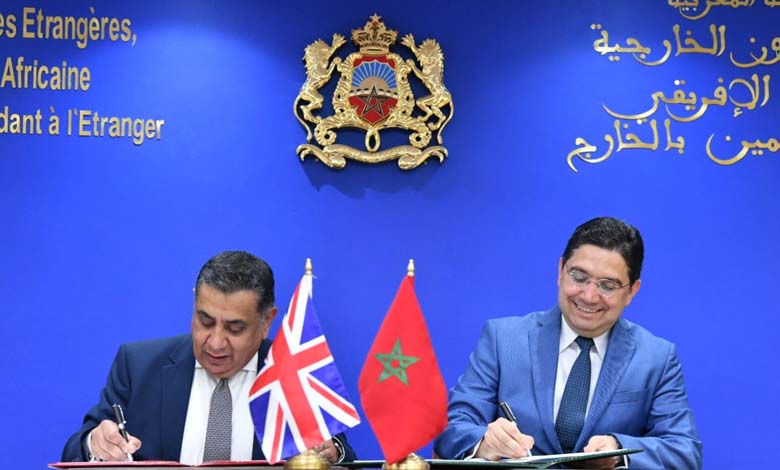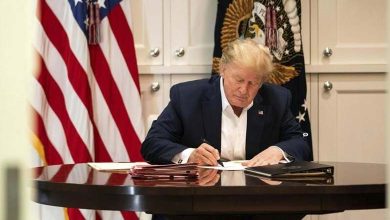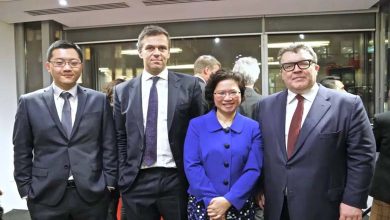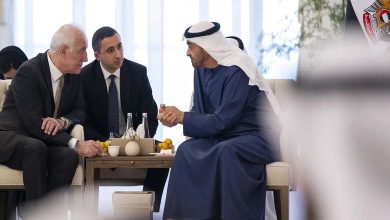Calls urging Britain to end its hesitation in recognizing the Moroccan Sahara
Voices are rising in Britain demanding full recognition of Morocco's sovereignty over the Sahara and enhancing trade relations between the two kingdoms

The increasing recognition of the Moroccan Sahara by other countries or Western politicians encourages calls for similar steps, as this recognition first aligns with legitimate rights and international law, and then with the vital interests of these countries with Morocco, which is considered a gateway to Africa and an important partner for opening up the region.
It is expected that London will move towards ending its neutral stance on the fabricated conflict in the Sahara and support the proposal for autonomy and Morocco’s sovereignty over its desert, as its strategic interests require strengthening relations with Rabat, as evidenced by the growing voices calling for this decision within government circles.
Morocco’s strategic position, stability, development, and progress make it a valuable partner in a region characterized by uncertainties. Morocco’s commitment to combating regional threats, as well as its economic growth and continental weight, provide numerous opportunities for British government and enterprises.
British House of Lords member Daniel Hannan called for “full Moroccan sovereignty” over its desert and for strengthening trade relations between the two kingdoms. In an article published by The Daily Telegraph on Saturday, he wrote, “We should not only remove tariffs, but we should also create a digital corridor between Tangier and our ports to reduce paperwork and facilitate investment, ensuring that our trade policy fully recognizes Morocco’s sovereignty over the Sahara.” He expressed his profound admiration for Moroccan industrial sites during his visit to the kingdom last week.
Closer ties with Morocco are vital for Britain, especially after the signing of several economic and trade agreements between Rabat and London following Britain’s exit from the European Union, as Britain relies on Morocco to compensate for trade exchanges with the EU and meet its needs, especially agricultural products. Lord Hannan, who is also the head of the Free Trade Institute, emphasized that Tangier Med Port “is not only the largest in Africa but also in the Mediterranean,” noting that “a huge automotive industry has developed around this infrastructure”.
He added that over the past twenty years, an aviation hub has been developed in Casablanca, in addition to connecting the country’s main cities with high-speed trains, considering that “only a few countries are well-positioned to produce wind and solar energy and their secondary product green hydrogen.”
London has drawn up a plan to lay an underwater cable to transport renewable energy from Morocco as a “project of national importance” after the necessary funding was secured for its implementation, meaning that bilateral relations between the two parties will be robust on multiple levels.
Lord Hannan affirmed that Morocco has made the strategic decision to diversify its economy, pointing out that the Free Trade Institute has proposed a series of suggestions to liberalize trade between the two kingdoms. He explained that such a policy would allow the United Kingdom to fully benefit from the opportunities provided by Brexit.
Since its exit from the European Union, Britain‘s relations with Morocco have seen significant developments on all levels, especially economically and commercially. Trade between the two countries has reached record numbers, supported by the desire of both parties to develop their partnerships to include various sectors and vital areas such as energy.
It is worth noting that British MP Liam Fox also called on the United Kingdom to provide full support to Morocco and recognize its sovereignty over the Sahara. He sent a message to Foreign Affairs Minister David Cameron, emphasizing the need for “a more effective and supportive stance by the United Kingdom” on the issue of the Moroccan Sahara.
The Conservative MP said in the letter that “a more effective and supportive stance by the United Kingdom towards the Moroccan autonomy initiative is essential not only for diplomatic relations, but also for peace and international cooperation.”
The British government recently appointed a trade envoy to Morocco, coinciding with trade between the two countries reaching over four billion dollars by the end of the current year’s first half.
British media reported that London is looking forward to signing a new trade agreement with the Kingdom of Morocco, similar to the Comprehensive Partnership Agreement that entered into force in January 2021. Economic observers noted that the transformations witnessed by the British economy after Brexit, in addition to the new economic stakes of the British government, are all indicators pushing towards strengthening relations between the two countries and also positioning Morocco as a significant strategic partner for Britain in both the near and far future.
These efforts are not limited to Britain alone but also see great momentum in the United Nations regarding the issue of the Moroccan Sahara. Local sources reported that a high-level international delegation comprising 17 ambassadors from permanent representatives to the United Nations Office at Geneva arrived in Laayoune in the Moroccan Sahara as part of a special tour including southern regions of the country. The tour includes a series of meetings starting with a bilateral meeting with the Wali of the region, Abdeslem Bekrate, who will provide detailed explanations and figures on the most prominent development projects and royal workshops that the region has witnessed, constituting a qualitative leap in the southern regions, especially the Laayoune-Sakia El Hamra region.












